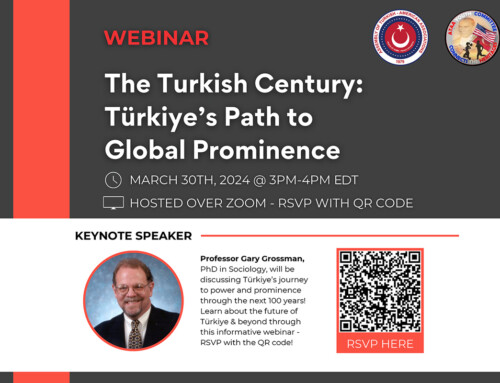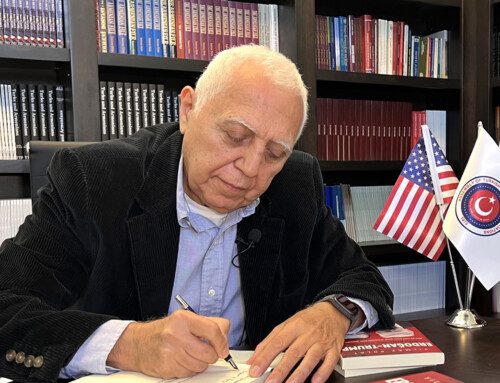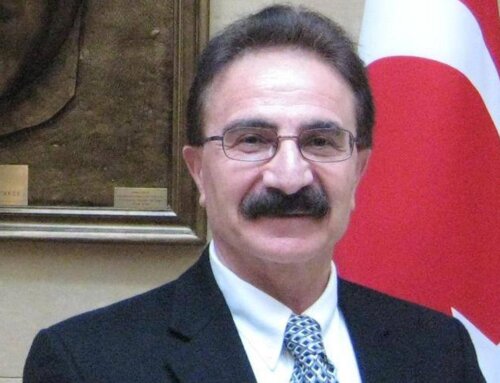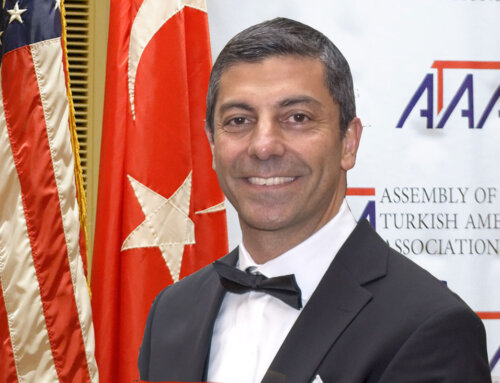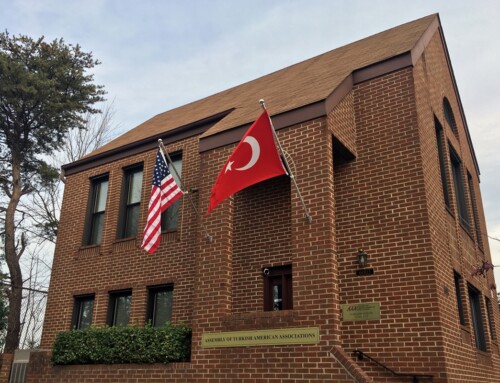ATAA President Gokhan Ozalp: “Now the children and the second generation of this third wave is our target”
Interview conducted by Bircan Ünver, The Light Millennium & TurkishLibrary.Us
TurkishLibrary.Us proudly presents an exclusive interview with the President, Assembly of Turkish American Associations (ATAA), GÖKHAN ÖZALP on the ATAA’s 40th Anniversary Celebration along with the 100th Anniversary of the start of Turkish War of Independence and Turkish Revolution through a long-day Conference in Arlington, DC on October 5, 2019.
This interview mainly looks through internally the ATAA’s 40 years’ background as the largest Turkish-American Organization in the U.S. It brings in Mr. Ozalp’s his own personnel involvement story with the ATAA along with it reveals ATAA’s current and near-future priorities and visions towards a more connected, unified, mobilized, effective and dynamic Turkish-American Community in the U.S.
In this over forty-years perspective, let’s acquire more insight from the first-source by Mr. Ozalp on ATAA on its 40th Anniversary Celebration program along with its both remained-and-to-be-changed visions and goals for the Turkish-American Community in the U.S.
When and how you become a member of the ATAA, and what was your prior and after experiences like in the U.S. as a Turk, and also being president of the ATAA?
– I became a member in 2005. I have heard about ATAA but being from Michigan it was not a familiar organization. But when our dear friend Nurten Ural (also a past president of ATAA) started becoming more involved with ATAA (she was also the Past President of the local Michigan Turkish Association) I started hearing and learning more about ATAA. However, it was my negligence not knowing ATAA, because TACAM (Turkish American Association of Michigan) is a founding member of ATAA in 1979. With Nurten Ural’s mentoring, first I become a Vice President of US Mid-Central Region in 2013, then the first VP and finally the President.
Being a member of ATAA and actively being involved with ATAA has given me a broader perspective in understanding the issues US Turkish American Community is facing in the US. Before ATAA, I was only concerned with local issues in Michigan. The US is very big and it is only possible to be engaged with the broader T.A. Community through a nationwide organization like ATAA.
Could you please introduce a brief history of ATAA, in particular, about its formation reason, need and vision in 1989? How was Turkish-American Community’s relations within then?
– By 1979, there was a crying need to address the attacks, the distortions of history, and the discrimination the Turkish-American community was facing every day in their jobs, at schools their children attended, and in their daily lives. Isolated local, Turkish American organizations were unable to cope with the massive work that needed to be done nationwide. Upon his arrival in Washington to take up the post of Ambassador from Turkey, Dr. Sükrü Elekdağ was met by members of both ATA D.C. and Maryland American Turkish Association (MATA) at a special reception held at the Navy Officers Club in Bethesda, Md. on September 23, 1979. He inspired both communities with his dynamic approach to U.S. Turkish relations.
In the aftermath of threats of yet another arms embargo passing through Congress with virtually no Turkish-American voice raised in opposition, a series of meetings were held in the Washington, D.C. area. A steering committee was formed in November 1979, headed by ATA D.C. President Yavuz Somen with the late Yurdakul Göker and Taşkın Atıl and by MATA President, the late Dr. Alp Karahasan, with Dr. Ülkü Ülgür, Cenap Kıratlı, and Şengün Nun. The advisor associates were Erol Gürün, Aydın Çağınalp, Hasan Akdemir, Tuncer Kuzay, and Ozcan Tuncel. Out of their meetings came an agreement to establish the nationwide Assembly of Turkish American Associations.
What are the top 3 or 5 major accomplishments of the ATAA during the last 4 decades on its 40th Anniversary?
– There are many accomplishments for ATAA over the 40 years since it is established. It won’t be fair to list a number of them here as top 3 because I have only been with ATAA for the last 6 years.
I can name a couple of here, which is why ATAA is the most respected umbrella organization in the US and in Turkey:
- There has been times that ATAA has stopped so-called, “Armenian Genocide” allegations attacking the Turkish-American community, stopped baseless resolutions in local/city and various state assemblies. This has been accomplished by the efforts of many tireless individuals and their meticulous work throughout the years.
- The great accomplishment of ATAA is its ability to bring the local Turkish-American Associations together whether physically through annual conferences or utilizing establishing a network of regional ATAA representatives. I want our community to understand this very important point about ATAA.
- ATAA is not a superior body over local organizations. With that, ATAA exists with the help of and because of local Turkish-American associations. Through local representation, ATAA can establish this bond between isolated T.A. associations in various states and regions in the US.
- Third is that ATAA has not changed its course or its founding values since from day one. This is a very difficult task as people, communities, politics and the world around them changes. We are still relevant to our community. Yes, there are times we may have been less vocal, but the relevancy has always been there since from day one.
- There are also many specific accomplishments based on programs or projects we have worked on over the years and completed for our community. One of these projects is a joint venture between Baskent University (Ankara) and ATAA and deserves special recognition. We will talk about the specifics of this project during our upcoming conference on September 5th, in Virginia.
In reference to the Baskent University and ATAA collaborations, could you please kindly provide a clue as to a nutshell on it?– It is briefly, this is a very unique language teaching platform, one of its kind. It is designed by experts in Baskent University and the United States.
How one can become a member? What are your membership requirements along with member responsibilities?
– It is very easy. If you are concerned with the issues for the broader Turkish American community, you can become a member by visiting our website, ATAA.org. We have individual, organizational and student membership options. We have a very reasonable annual membership fee.
Beside membership categories, what are the other channels to be engaged and involved and/or collaborate with the ATAA both on the individual and/or organizational level?
– As I mentioned before, our mission is to bring our community together. Empower and educate our community to support better US-Turkey relations. Promote and preserve our culture within our communities. This is only possible with the broader engagement of the community. We invite them to become members. However, they don’t need to be a member to engage. They can reach out to us. They can be involved by working in our committees. We are open 24/7 and can be contacted at any time. Our lines of communication are open. We are always in need of volunteers, especially during our annual conferences.
“Empower and educate our community to support better US-Turkey relations. Promote and preserve our culture within our communities.” In this objective, could you please elaborate on it further, in particular, about: How and What sorts of Program and Strategies are on the table and/or horizon?
– ATAA’s basic strategy is to stay connected with the Turkish American community. We have several projects we are considering to stay connected, be relevant and educate our community for empowerment through better US-Turkey relations. One of those projects is to create a library of templates to help local chapters’ request and obtain proclamations for the Turkish Republic’s national days. ATAA will provide educational content as well as the templates for proclamations. Another project is our “guest speakers” project. We will be working with local chapters to organize seminars to educate our communities on issues related to the Turkish-American community.
What are the channels to collaborate for joint-projects on the local or regional level, in particular, those may not be member organization(s) but towards investing in it and gaining them?
– We are open to collaborate with all local or regional organizations as long as they share the same values as ATAA. This collaboration can take place as joint projects or programs or sharing resources.
How have the ATAA’s majority member profiles been shaped and formed in ref to education, professional, age, gender, etc. as the overall mosaic of the ATAA members?
– I don’t want to draw a specific profile for membership, but I can say this; we have our founding principles, we respect the rule of law, human rights, and democracy. We are a Turkish American Association, therefore we are staunch supports and defenders of the Turkish Republic its founding principles as set by Ataturk and other founding fathers. We welcome, anyone to our community who share the same values.
Could you please share with us of the ATAA’s Governing and Working mechanism as a Turkish-American Civil Society Organization?
– ATAA has a board of directors, and board of trustees as two major governing bodies. There are many subcommittees established for various programs and projects. ATAA’s operations are governed by the Board of Directors. The Board is made up of the President, Past President, Treasurer, General Secretary and nine Vice Presidents representing 9 different regions in the US.
Could you please elaborate on the (or describe more on the each of the “two major governing bodies”?
– They are the Board of Directors (BOD) and the Board of Trustees (BOT). All executive powers of the organization lay in the Board of Directors. All members of the BOD are elected individuals, approved by the Assembly of Delegates. Assembly of Delegates is formed by representatives from member local components. Board of Trustees composed of twelve members. They are elected by the members.
“Our vision has to be established in parallel with the needs and demands of this [new] generation. To do that, we are looking into starting a new project to become an NGO within the United Nations.
What are your own, both short and long-term programs and visions towards strengthening and empowering the Turkish-American Community through ATAA in the U.S?
– One has to understand and the fact is that before we talk about the vision for ATAA. Our community is changing. Yes, Turkish migration to the US is very old, as old as the 1890’s, however, the first wave of migration did not establish a diaspora in the US. The second biggest migration to the US was in late 1950, the 1960s. Many highly educated professionals have migrated to different states in the US. This group of individuals was able to establish what would become the basis for a Turkish diaspora. The majority of most established Turkish associations were established during the 1960s and 1970s. Federation of Turkish American Associations, Turkish American Association of Michigan, and definitively ATAA are good examples of it. Following years, 1980, 1990 many young individuals came to the US for higher education, and they are still coming. This is not a migration per se but most of these individuals stay in the US after higher education. This is the third wave. Now the children and the second generation of this third wave is our target. Our vision has to be established in parallel with the needs and demands of this generation.
- Based on the above, we are looking into programs and projects to outreach to the new generation. We will certainly update our vision based on the above as well.
- Upcoming generation has interests and needs that are not local but global. We will be seeking long term relationships with organizations that have global interests. To do that, we are looking into starting a new project to become an NGO within the United Nations. This we believe, will open up a new venue for us to promote our culture to a global audience. This is certainly a more attractive venue for the new generation.
What are your existing Youth related programs to attract Youth generations both as the third-wave and future comers?
–ATAA has not established a specific Youth program yet, but this is our goal for the year 2020.
What are your programs and vision to make ATAA more relevant to all the Turkish-American community at large?
– We are a cultural organization. In our future programs, we will be emphasizing the aspects of our culture that are shared universally by our members and followers. By saying culture, I do not just mean food, music or folklore, these are important too. However, I mean the universal values we share, that makes the unique Turkish – American culture in the US., that are respect and support of the founding principles of Turkish Republic set by Mustafa Kemal Atatürk, and respect for rule of law, democracy and human rights. We will be organizing seminars in various states to engage or communities with respected speakers to talk about these values.
What will it take to change the ATAA’s well-established perception that it mainly deals with the Armenian Diaspora to a much more broader and diverse one?
– Yes, it has been perceived that ATAA’s pure focus is on the “Armenian” related issues. This is normal because ATAA was founded to serve as an umbrella organization to defend our community from these baseless accusations.
However, as I mentioned before the dynamics have changed. I have always defended this position that FETO (Fettullah Gulen Terrorist Organization) was even a bigger and imminent threat to our Republic and to the Turkish-American community in the US. And this turned out to be true because this terrorist organization had caused great and direct damage to Turkish Republic. Its shadow is still looming in different circles in Turkey. We have to understand that if Turkish Republic cease to exist then there will be no cause to defend ourselves from the baseless accusations of “genocide“. This is why we will support new programs promoting rule of law, democracy and human rights in Turkey and in the US. I am not saying we will abandon our reputation for being the Turkish umbrella organization that deals with the Armenian Diaspora, but this will not be the soul focus of the organization in the future. The UN program we will be undertaking is a big step towards establishing this new perception. This will take time but we will be persistent.
We all know well that if a Kurd or Armenian or Jew or Rum Orthodox Christian migrated from Turkey, they hardly say, I am “Turkiyeli”, instead, whatever their religious identity or ethnicity.
On the other hand, in particular, during the last decade and up to date, we’ve been witnessing frequently that there has been a multi-layered political push towards replacing “Turk” or Turkish” in the US with a made-up word, “Turkiyeli” (Turkian/although there is not such a word or as in translation in English). This particular approach has been injected through various channels in the name of “embracing all of those who migrated from Turkey to the US”.
In this push and political injection, I consider that all the Turkish citizens and “being Turks” have been under attack towards putting all of us under a “minority” category, instead of owning and conveying our cultural identity and background in the US! What is ATAA’s stand point on this?
– When Turkish Republic was established, this was clearly discussed by our founding fathers and Ataturk has clarified the discussion in his definition:
“The people who established the Republic of Turkey are the Turkish people.” In this description Turkish does not contain any reference to an ethnicity but references a group of people (free from any ethnicity or religion) who had fought and worked together to establish the Republic of Turkey.
As I mentioned before, ATAA is a staunch supporter of founding principles of Republic of Turkey.
Now, ATAA both will celebrate its 40th Anniversary and the 100th Anniversary of the “May 19, 1919” the date was launched by Ataturk Independence War against aligned occupied power of the time. Could you please give us some highlights about the Conference and 40th Anniversary celebration program?
– The conference is designed to celebrate both our 40th Anniversary but more importantly the 100th Anniversary of start of Turkish War of Independence and Turkish Revolution.
We have invited experts to speak about the Turkish War of Independence and its impact to the world politics. As known, it is the Turkish War of Independence is fought in Turkey but the outcome has a bigger impact on the then world politics and the Muslim world.
We have also invited distinguish speakers that we believe will excite our community with their speeches on ATAA, Turkish Americans and Turkish War of Independence. Our distinguished speakers are Prof. Emre Kongar, Dr. Yalcin Ayasli and Hon. Edward Whitfield. Prof. Kongar, I believe does not need an introduction as he has a big fan base in the US. So as Dr. Yalcin Ayasli as the founder of Turkish Coalition of America. Hon. Edward Whitfield is the founder of Turkish Caucus and have been a strong ally for the Turkish-American community.
Our conference will be followed by a reception and a Gala Night with award ceremony and live music.
Is the Conference open only to ATAA members and delegates or to all interested individuals? And, what are the expected number of the attendees of the Conference?
– The conference is open for general public who are interested in celebrating the 40th Anniversary of ATAA and the history of War of Independence of Turkish people in the early 20th century. We are expecting between 100-200 attendees.
Will there be an Outcome Report of the Conference to be posted on your website including presentations follow by the conference in order to make its all concept and your landmark event’s contents available to all interested parties globally?
– There will be a Summary Report of the Conference accomplishments. The report will be available online on the ATAA.org website. It will also be emailed to our mailing list.
As one of the two largest Turkish-American umbrella organizations in the US along with the FTAA, are there mutual programs or projected-ones in terms of bringing the largest possible Turkish-American community together in the US?
– We certainly hope to work with FTAA. FTAA with ATAA is one of the oldest and prestigious umbrella organizations in the US. I was fortunate enough to attend this year’s Turkish Parade in New York. It was a big success with many attendees. I commend the Federation for this year’s Turkish Parade. The Federation’s mission, their values, founding principles and their support for Ataturk’s Republic have always been in parallel with ATAA. We have worked together in the past on we hope to work together in the future.
ATAA has made a unique history over 4 decades during last 40 years on behalf of the Turkish American Community in the US, in particular, from the Civil Society Perspective, visibility and contributions. In this line, what are the first 5 things/programs that you would like to see that ATAA has implemented and accomplished on the utmost level during the next 5 years as well as by its 50th Anniversary?
– ATAA like all other local Turkish-American organizations have to raise funds and needs volunteers to stay active and vibrant. To be frank, these are important challenges needs to be addressed. I believe if ATAA understand the changing demographics and profile of communities and manages to stay relevant to the new generation of Turkish Americans, these two challenges will be there but will only have a minor impact on the organization. To understand and stay relevant, our strategy is to get our organization involved in programs which we think will excite the communities and will enable ATAA to outreach to a broader audience.
As the final question, could you introduce ATAA’s new project “Bright Future” please? And, when do you plan to implement it?
Bright Future is ATAA’s most important project so far. It is a joint venture between Baskent University and ATAA. It is an online Turkish language teaching platform for children ages 8-12, 13 and up and also for adults. This one of a kind platform not only teaches language but also teaches aspects of Turkish culture as well. This most valued and impressive project will be launched during the first quarter of 2020.
Thank You.

